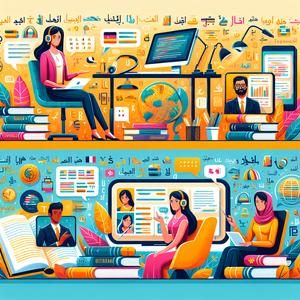
Exploring the Multifaceted World of Translation: Roles, Skills, and Career Opportunities
The realm of translation is rich and varied, encompassing numerous roles that cater to distinct types of texts and industries. This diversity not only showcases the intricacies of language but also underscores the vital contributions translators make in bridging cultural gaps. As the pace of globalization quickens, the need for specialized translators—particularly in legal, medical, technical, and audiovisual domains—continues to rise. This article aims to unpack the wide array of translator roles, the essential qualifications and skills required, and the promising career opportunities within this ever-evolving field.
Job Summaries:
Literary Translator:
- Literary translators bring creative works—like novels, poetry, and plays—to life in different languages.
- Their mission is to preserve the author's voice and cultural subtleties, making literature accessible to a broader audience.
- Typically, a degree in literature, linguistics, or translation studies is beneficial, alongside a genuine passion for storytelling.
- Literary translation can be highly rewarding for those who cherish the written word, with a strong portfolio often leading to enhanced career opportunities.
Technical Translator:
- Specializing in fields such as engineering, IT, and medicine, technical translators convert intricate documents into comprehensible language.
- They are tasked with translating manuals, user guides, and other specialized texts.
- A solid background in the relevant technical area, paired with language proficiency, is essential.
- As businesses increasingly operate on a global scale, the demand for adept technical translators is on the rise.
Legal Translator:
- Legal translators navigate the complexities of legal jargon.
- Translating documents like contracts and court filings.
- This role requires language skills and a thorough understanding of legal concepts.
- Many legal translators pursue advanced degrees in law or translation.
- Legal translators may seek certifications to bolster their credentials.
- The expansion of international legal frameworks fuels demand for these specialized professionals.
Medical Translator:
- Tasked with translating healthcare-related documents, medical translators ensure that critical information—like clinical trial reports and patient instructions—is conveyed accurately.
- A strong command of medical terminology and a background in health sciences are typically necessary, as precise communication is crucial for patient safety.
- As healthcare increasingly globalizes, the need for skilled medical translators continues to grow.
Audiovisual Translator:
- Audiovisual translators adapt scripts for films and television.
- They create subtitles and dubbing that resonate with diverse audiences.
- This role requires creativity and an acute sense of timing and cultural nuances.
- Proficiency in both source and target languages is mandatory.
- Many audiovisual translators possess backgrounds in film studies or communications.
- The rise of streaming platforms has spurred a significant demand for these professionals.
Software Localizer:
- Software localizers modify applications for various languages and cultural contexts.
- They blend linguistic translation with cultural adaptation.
- Their expertise ensures that user interfaces and marketing materials connect with local users.
- A background in computer science or localization is often preferred.
- The need for skilled localizers continues to expand as technology evolves.
Machine Translation Post-Editor:
- Post-editors refine translations generated by machine translation systems, enhancing accuracy and fluency.
- This role requires a robust command of both source and target languages, along with familiarity with machine translation technology.
- Given the growing reliance on automated translation tools, the demand for proficient post-editors is increasing.
Conference Interpreter:
- Conference interpreters provide real-time translation at multilingual events, facilitating effective communication.
- This role necessitates exceptional listening and speaking skills, along with expertise in relevant subject matter.
- Many interpreters hold advanced degrees in interpretation or linguistics, often accompanied by specific certifications.
- The proliferation of international conferences has notably augmented the need for skilled interpreters.
Business Translator:
- Business translators focus on corporate communications.
- Translating reports, marketing materials, and proposals to ensure effective cross-language communication.
- A background in business or marketing is highly advantageous.
- As companies expand their global reach, the demand for skilled business translators continues to rise.
Website Localizer:
- Website localizers adapt online content to suit different languages and cultural contexts.
- They ensure websites engage local audiences.
- This role requires a mix of language proficiency, web design insight, and marketing knowledge.
- As businesses increasingly bolster their online presence, the demand for website localizers is on the rise.
The translation industry is a vibrant field offering a multitude of career opportunities, each with distinct responsibilities and skill sets. Whether your interest lies in the nuances of literary translation or the precision of legal documentation, there’s a niche that matches your skills and passions. As globalization continues to influence our interconnected world, the demand for skilled translators is set to increase. If you’re contemplating a career in translation, consider exploring current job listings and take the first step toward a fulfilling profession that bridges languages and cultures. By embedding real-world examples and insights from seasoned professionals, this narrative not only highlights the roles within translation but also emphasizes the profound impact these individuals have in facilitating global communication.
Explore More JobsRecommended Articles
A Practical Guide to Starting Your Freelance Journalism Journey: Essential Roles, Skills, and Opportunities
The Future of Careers in Translation and Interpretation: A Comprehensive Guide to Top Roles, Trends, and Opportunities
Career Paths in Translation: 15 Promising Opportunities for English to Spanish Translators